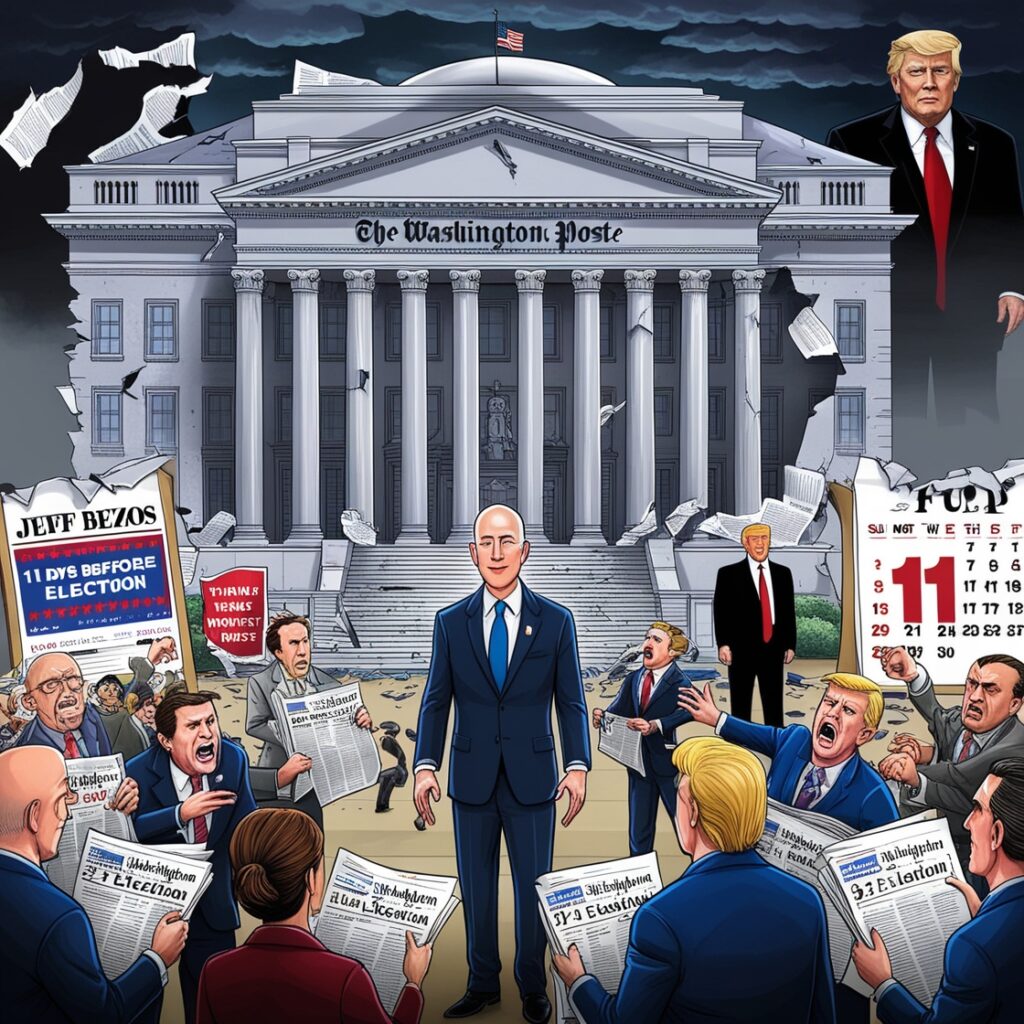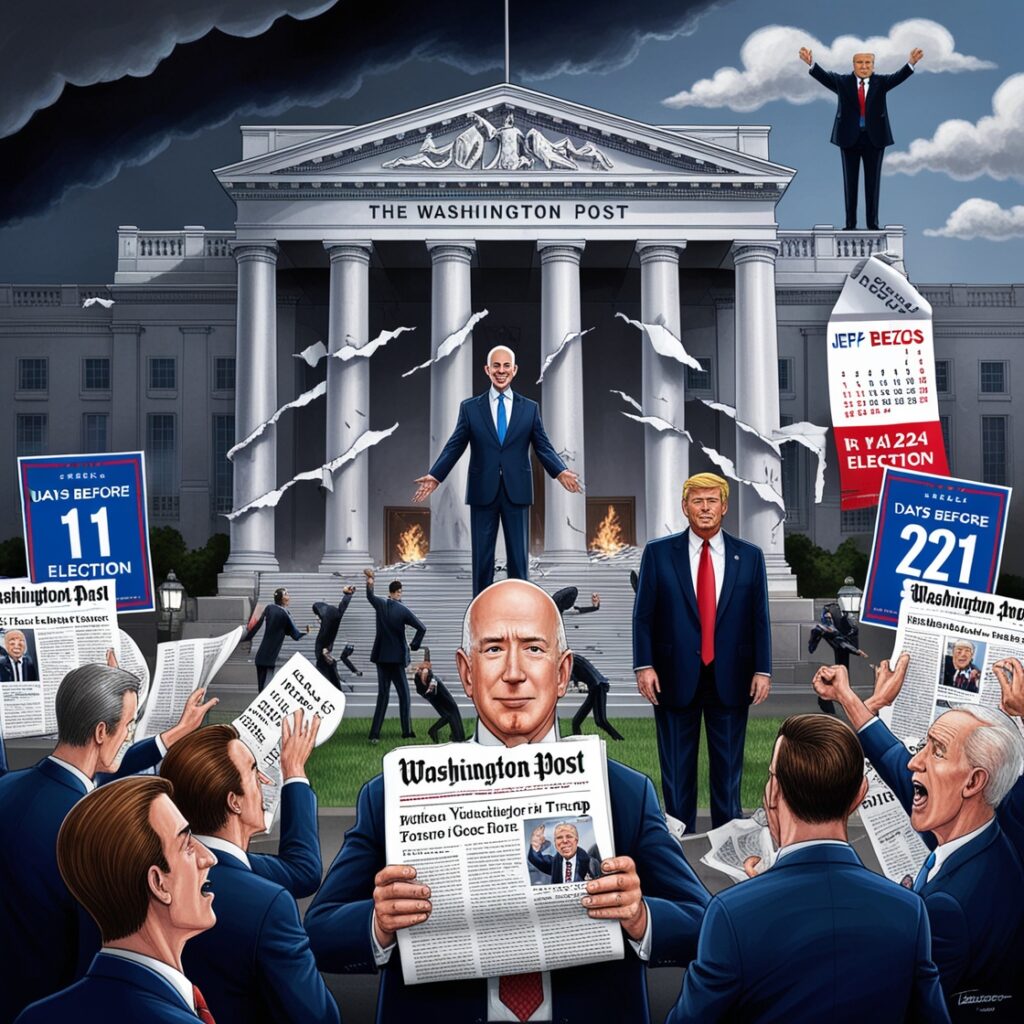Introduction
The Washington Post has recently found itself in the midst of a significant controversy after announcing that it will not endorse any presidential candidate for the 2024 election, nor in the future. This unprecedented decision has left many within the organization in turmoil, with staff members expressing their frustrations and dismay at the timing and reasoning behind the announcement. The silence from the Post’s billionaire owner, Jeff Bezos, has only exacerbated the situation, leading to speculations about his role in the decision-making process.
Jeff Bezos’ Silence Amidst the Controversy
The Role of Bezos in the Endorsement Decision
Despite being the owner of The Washington Post, Jeff Bezos has remained silent about the recent decision to forgo endorsing any candidate in the upcoming presidential election. This has led to widespread unrest among the staff, with many journalists believing that Bezos had a direct hand in spiking the planned endorsement. According to sources, an endorsement for Vice President Kamala Harris had been drafted, but it was ultimately scrapped. This move has raised eyebrows, especially given the historical significance of The Washington Post’s endorsements in past elections.
Resignations and Public Discontent Among Staff
Within 24 hours of the announcement, at least one editor had resigned, and prominent staff members in the Post’s Opinion section publicly voiced their dissatisfaction. Many see the timing of the decision, just days before the election, as highly suspicious, leading them to speculate that Bezos’ broader business interests may have influenced the choice. The timing has also given rise to concerns that The Washington Post is caving to external political pressures.
Criticism from Former and Current Employees
Marty Baron’s Strong Critique
Marty Baron, former executive editor of The Washington Post, has been one of the most vocal critics of the decision. Baron, who led the paper during the first Trump administration, did not mince words, calling the non-endorsement “cowardice.” He questioned the rationale behind making such a significant decision just 11 days before the election, implying that it was not a matter of principle but rather a calculated move influenced by outside factors, including Trump’s continuous threats toward Bezos.
Editorial Concerns and Reader Reactions
Many current and former staff members are concerned about the repercussions of the non-endorsement on both the newspaper’s reputation and its readership. Several journalists voiced their concerns that the decision will lead to a loss of trust among readers, many of whom have already canceled their subscriptions in response to the news. This, in turn, could impact the Post’s ability to continue producing high-quality journalism. One journalist remarked that the paper now faces a “lose-lose” situation: either appearing as cowards for not endorsing or being seen as biased for not supporting Harris.

The Defense from Post Leadership
Will Lewis’ Statement
Will Lewis, the publisher of The Washington Post, defended the decision, stating that it was based on the belief that the newspaper should remain independent and allow its readers to make their own choices. In a statement to CNN, Lewis denied reports that Bezos played any role in the decision-making process, asserting that the billionaire owner was not involved in the discussions. Lewis argued that The Washington Post’s decision should not be interpreted as a tacit endorsement of any candidate or a condemnation of another.
The Impact on American Democracy
Despite Lewis’ defense, many, including legendary journalists like Bob Woodward and Carl Bernstein, have expressed disappointment in the newspaper’s stance. In a joint statement, Woodward and Bernstein argued that the decision undermines the principles that The Washington Post has historically upheld. They highlighted the overwhelming evidence of the threat posed by Donald Trump to American democracy, pointing out that the paper’s refusal to endorse a candidate ignores these critical facts.
Reactions from the Political Sphere
Trump’s Response
The decision not to endorse Harris has been met with glee by the Trump campaign. Trump supporters, including senior adviser Stephen Miller, seized on the non-endorsement, using it to suggest that the Harris campaign is in trouble. Trump himself has a long history of criticizing Bezos and The Washington Post, and this development has only added fuel to the fire. Trump’s team even linked the non-endorsement to Bezos’ business dealings, suggesting that the billionaire was trying to avoid further attacks from Trump.
The Connection to Bezos’ Business Interests
One of the key factors fueling the speculation surrounding Bezos’ involvement is his other business ventures. As the owner of Amazon and the space exploration company Blue Origin, Bezos has significant commercial interests that could be affected by a second Trump presidency. With Blue Origin holding a $3.4 billion contract with the federal government, some believe that Bezos is attempting to curry favor with Trump in anticipation of a potential electoral victory. This theory was further supported by reports of a meeting between Trump and Blue Origin executives just hours after the non-endorsement decision was made.

Conclusion
The decision by The Washington Post not to endorse a candidate for the 2024 presidential election has sparked widespread controversy both within the newsroom and in the broader political sphere. While Jeff Bezos remains silent on the issue, the timing of the decision has led to intense speculation about his motivations. As the election approaches, the ramifications of this unprecedented move will likely continue to unfold, with potential long-term consequences for the newspaper and its role in American democracy.


